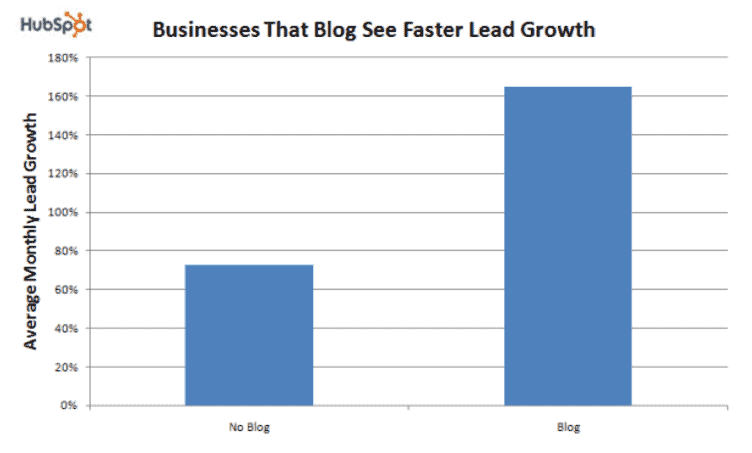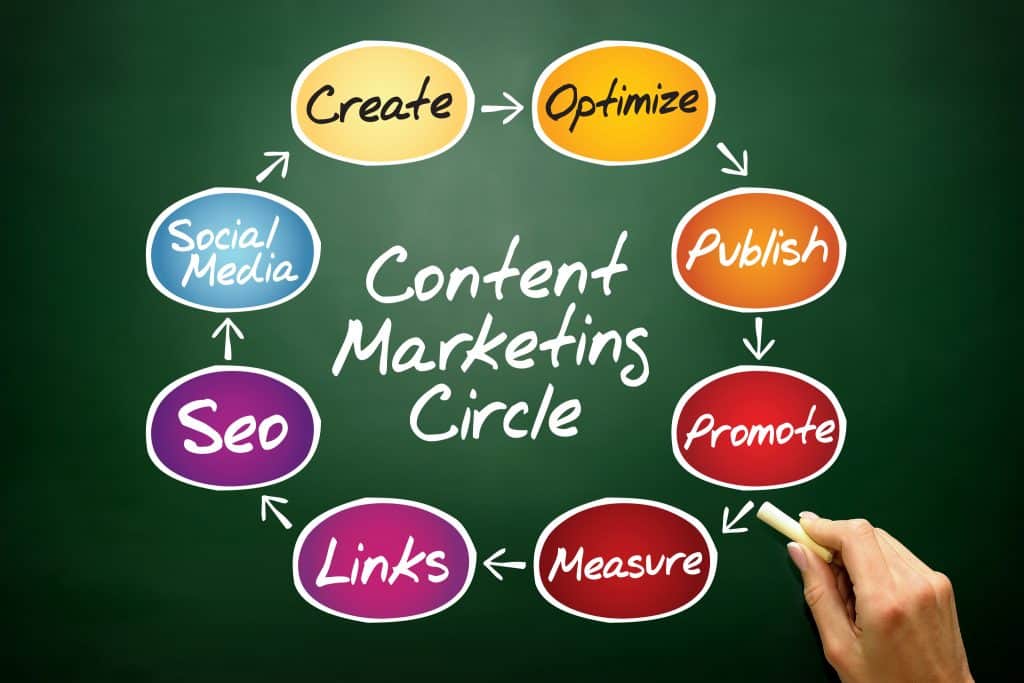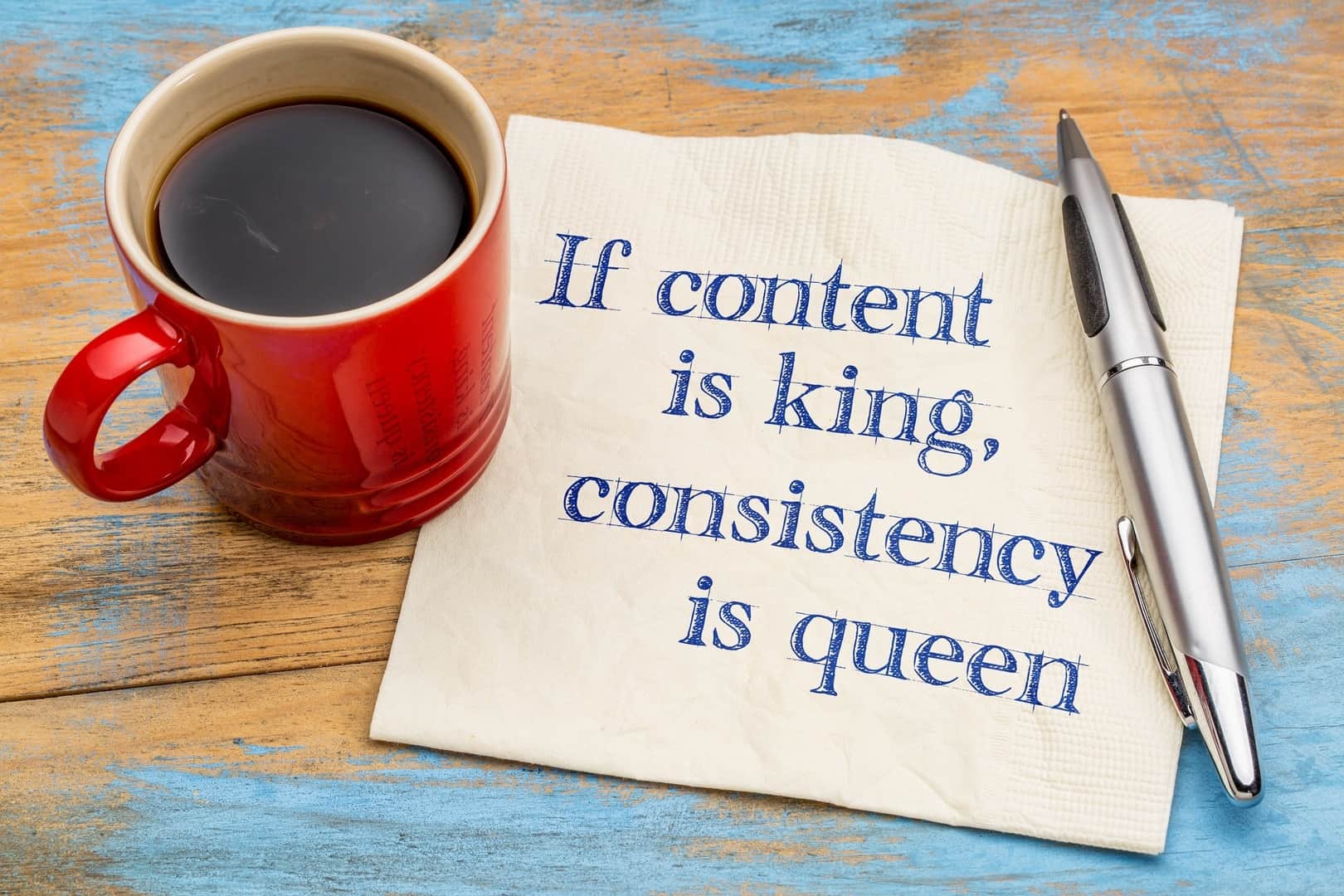
Does Content Marketing Work For Small Businesses?
Content marketing for small businesses. Without it, will your small business thrive?
It might feel as though you are constantly told that you must implement content marketing in order to survive as a small business in the current market. But is that really the case? Many businesses continually wonder whether content marketing for small businesses is worth the time, money and effort, especially when they do not see immediate payoffs to their efforts.
Is Content Marketing for Small Businesses Worth It?
The answer is: yes, content marketing absolutely works for small businesses. Not only that, it’s the great equalizer in marketing. While larger businesses can throw hundreds of thousands of dollars a month at ad spend to come up first in search engine rankings, small businesses can own the market on certain keyword phrases when thy have long-form, quality, valuable content to offer consumers.
A couple hundred dollars put into a really good blog post can eventually rank near the top for a keyword phrase that another company is spending thousands of dollars in ads for. If you’re a small business, this is the best way to get the most long-standing value for your marketing spend.
With that in mind, the question becomes more about whether or not small businesses can afford NOT to do content marketing.
What is Content Marketing for Small Business?
To start, it’s important to define what content marketing actually is. The Content Marketing Institute defines content marketing for small business as a “strategic marketing approach focused on creating and distributing valuable, relevant, and consistent content to attract and retain a clearly defined audience.” Essentially, instead of blatantly pitching your products and services to your customer base, you’re providing relevant, valuable information to your prospects to help them solve their own issues.
Seems a bit counter-intuitive, right? Why would you tell someone how to do something themselves when you want them to use your product or service instead? The answer lies in building trust, authority and brand recognition. Chances are the product or service you provide solves a pain point for your customers. Just because you give a potential customer some tips and tricks to use to help solve their own problems, doesn’t mean that they will do it themselves. Rather, you’re building trust with your customer base that you care about them and want to provide good, accurate information.
When the problem does arise again, they’ll usually opt for a professional, someone they trust, to come in and do the job right. If your content has been able to reach them before this point, your small business is much more likely to come to mind when they’re ready to purchase.
What are the Benefits of Content Marketing for Businesses?
As a small business owner, you have to constantly determine what is worth implementing to grow your business. Many factors are involved, including time, money and manpower. But the underlying truth is that if you don’t continually bring in new leads to your business, you’ll eventually run yourself out of business. And with the internet becoming more and more prevalent for savvy customers, being found online is becoming a must.
Small business content marketing (or SMB content marketing) is actually great for your bottom line. Initial costs are relatively low for what it can produce in the future. The key is being consistent, persistent and, ultimately, patient. Most of the benefits of content marketing don’t come until months down the road.
There are many benefits of content marketing, including the following:
- Increased leads
- More sales
- Higher SEO rankings
- More traffic to your sites
- Brand awareness
- Reputation building
- Develop an authoritative voice
- High ROI
Let’s break this down one by one (in no particular order) so you can see exactly how these content marketing advantages can help your company.
1. Increased Leads and More Sales
As a small business, it is important to find more potential customers to convert into sales. With content marketing for small businesses, you have the chance to expand your reach. This gives you an opportunity to bring in more leads that can then be sent through your sales funnel. With more leads, you have a higher chance of converting them into sales, thus increasing your revenue.
Want some small business examples? Here you go:
According to a study from HubSpot, businesses with a regularly updated blog found an increase in leads of 126 percent compared to those who did not blog. Imagine what you could do with that many more leads! In fact, the conversion rates are about six times higher for those businesses who have content marketing campaigns than those who do not.

Graph from https://blog.hubspot.com/blog/tabid/6307/bid/5519/Blogging-Businesses-Experience-126-Higher-Lead-Growth-Than-Non-Blogging-Businesses.aspx#sm.000153vw0ncs7f39s661qjhbcy1lt
2. Higher SEO Rankings
The algorithms for Google and other search engines are very involved and complex. Content marketing for small businesses helps with a couple components. First, it expands the amount of information about your company that could be pulled during a search. Content marketing for business gives you more online real estate to help end up as part of search results. It gives you a chance to give visitors specific information that answers the queries they’ve typed into Google.
Additionally, best practices in content marketing include creating fresh, new content. This helps improves your chances of increasing organic search rankings.
3. More Traffic
When you increase your ranking on search engines, you increase your organic traffic to the site. You also have the ability to gain traffic for a variety of topics, all of which end up on landing pages from where consumers can then navigate to other areas on your site. According to one study, small businesses that are considered content marketing leaders had 7.8x more traffic on their sites than those who were non-leaders.
The key comes in doing some really great keyword research for your smb content marketing campaigns. What are your existing customers searching for? What are prospective clients searching for? What keywords have a lower level of difficulty than others and are therefore more winnable? A lot of the strategy comes down to which keywords and queries you want to focus your content marketing ideas on. Once you start putting out the article content, you’ll quickly see the benefits of this sort of article marketing if you’ve done great keyword research beforehand.
4. Brand Awareness and Reputation Building
An important benefit of online marketing for small businesses is that it helps to build your brand. You have multiple platforms in which to build your brand identity and voice. Then, you promote it and raise awareness about your company, attracting more customers from a wider pool of potentials.
In addition to simply putting the word about your company out into the public, you also have a chance to create the reputation you want through developing positive content. Part of this goes hand in hand with developing your brand identity.
Additionally, you can create content that makes you stand out as a leader and authoritative voice in your industry. This increases the chance that others will share your content, building even greater awareness of your brand. Furthermore, as an authoritative voice in your industry, you also become a safer, more reliable company with which to do business.
What do all of these content marketing benefits have in common? They boost your small business, help you compete and drive sales. This helps your bottom line, and it does not cost as much as many other forms of marketing. Brand marketing done through content marketing for business makes it easier to compete, even with some of the larger businesses in your field.
To gain the maximum advantages of this, it is essential that you do it right.
What are Content Marketing Best Practices for Small Businesses?
There are several best practices in content marketing for small business that ensure you gain all the potential advantages of the medium. Whether you choose to invest in website content writing solutions or handle it in-house, there are some key steps to take to develop your properties:
- Create a goal or objective
- Research the target audience
- Plan
- Develop content
- Promote
- Measure
- Make changes
Create Goals
It is common for small businesses to jump into running a content marketing campaign with no real objective in mind. This makes it harder to bring in the rewards and replicate any positive results in the future. It is best to develop an objective or goal using the SMART (specific, measurable, attainable, realistic, timely) goal method.
Some small business examples of good content marketing goals might be sitting down and identifying the number of blog posts you want to create and the word count length of the blog posts. Next, schedule the posting times of the content and how many pieces of SEO content you’d like to create a month. After that, get into the specifics of keyword research and identify the top keywords to target in the content creation. Lastly, set times to measure, report and adjust the content and ultimately track the increase of rankings and traffic for certain keywords.

Identify Your Target Audience
Then, determine who your target audience (or audiences) is. This might require some market research into your current customers and those you wish to bring into your business. You might consider doing some surveys of existing customers or using outside help to gather data of your ideal customer. Knowing your audience is crucial to content marketing for business and should be done before you write any content.
You’ll want to know who you’re speaking to and what they’re looking for in order to connect with them on any sort of level through your writing.
Prepare a Content Marketing Plan
Once you have a goal and audience in mind for your small business content marketing strategy, develop a plan. This might include who writes the content, what topics it will cover, the voice of the pieces, the type of SEO content you’ll need to write, and other components. Content marketing best practices include creating an editorial calendar where you can track the keywords you are targeting, where the content is in the development process, and when it will be submitted.
Marketing strategy best practices also include the creation of a style guide for whoever writes the content. This includes going over brand guidelines, outlining your target audience and explaining formatting, voice and tone. These tools are essential to getting content out timely and just the way you want it.
To build a “brand voice” you have to stay consistent to who you are. If every piece of content looks, feels and sounds different, you’ll lose customers who don’t feel they can trust who you are trying to be.
Create High-Quality SEO Content
Once you have a basic structure/template in mind that determines the program, it is time to start developing content. This might be through a blog writing service, in-house staff or a combination. If you’re trying to scale your content marketing efforts to any degree, using in-house staff (or writing it yourself) goes out the window pretty quick. Be sure to have a content development budget in place so you don’t run into any surprises when you get to this stuff. Getting the content written can be half the battle. Find a good writing partner and get to work.

Promote Your Posts
You are not done once the content is written. No matter how strong the content is, it is just as important when engaging in content marketing for small business that you promote it in the right places. Otherwise, no one will find it. This might include some combination of social media promotion, featured posts, PPC campaigns, SEO and keyword optimization. More advanced content marketing campaigns use internal linking as one tool in order to drive ranking to “pillar” pieces that target the highest value keyword terms.
Until then, get creative with your promotion and leverage your existing following and networks to spread the word.
Measure The Results
Once the content is posted and promoted, your job continues. It is essential to any online marketing campaign that you continue to monitor it using different metrics, such as conversation rates, traffic, bounce rates, keyword rankings and more. This will tell you what works–and what does not. Then, you can tweak your small business content marketing program so that it continues to improve and helps you to meet your goals.
Elements of Strong Content Marketing for Business
When developing your content marketing strategy for your small business, it is important to remember that there are some key elements involved in a strong content marketing campaign. Content marketing for business is more than just creating well-written, interesting content every once in a while. It also includes:
- Ideal timing and frequency
- Relevancy
- Value
- Visuals like infographics
- Optimized keywords
Frequency and Timing
There are many facets to how frequency and timing play a role in online marketing for small businesses, but one of the most important is a point we’ve referenced to above – the frequency of posting. Studies have shown that companies that blog 16 times or more a month see 3.5 times the traffic of companies that only post 0-4 times a month! So not only is having a single really good blog post here or there beneficial, it’s important to be putting out new content frequently to maximize your results.
That being said, most small businesses can’t start out at creating 16 blog posts a month right off the bat when beginning an online marketing campaign. This could either be due to budget constraints or bandwidth constraints. If bandwidth is the issue, you may consider looking into hiring SEO content writers or a content writing company to help you scale your content creation efforts. If budget is the issue, you’ll want to look at reallocating some of your other expenses to be able to put more towards content.
But until you give content marketing for small business a real chance and put some money towards it, you[‘ll never know the benefits it could bring to your business. Don’t be that business owner!

Relevance
The next thing to consider when looking at elements of a strong content marketing strategy for business, is the relevance of your content. Are you picking topics to focus on only because they have high search volume traffic every month? Or are you picking keyword phrases and topics that are specifically relevant to what you do?
While there can be some value in getting lots of traffic to your site, no matter what the keywords are, if your small business and its products and services aren’t relevant to the content you’re putting out, it won’t net you too much of a return. Remember, a very specific keyword phrase that would point someone specifically to you is much more valuable than a broad, high volume, winnable term.
Value
Successful content marketing for small business hinges largely around the amount of value the content provides potential customers. You may be an SEO optimization king, and get your posts to rank by injecting keywords all over your content, but if the article isn’t providing value to the people reading it they’ll jump ship and go to other websites (your competitors) to find content that’s actually worth something to them.
Make the most of your content marketing opportunities by creating high-quality, valuable information first and then optimize for search engines second.
Visuals
Additionally, do not forget that content is not just written words and blogs. Some of the most popular content forms today include webinars, infographics, videos, podcasts and similar content forms. Depending on the way your customer base prefers to digest information, you may find that visual content is a huge needle mover for you. This is where the really creative side of content marketing comes into play.
Example of an Infographic in Content Marketing for Small Business

Infographic from www.zabisco.com
Content marketing ideas for visuals don’t have to be limited to what we’ve suggested here – try some new ways to educate and inform your followers and you may be at the forefront of the next content marketing trend. Storyboard animations, video scripts and many other forms of media have been used to convey information and can be successful avenues to pursue.
Optimization
Last, but not least, to make the most of your content marketing for small business, you’ll want to make sure you’re constantly optimizing your content for both readers and search engines. We’ve previously written about how to use keywords in your SEO content, so take the time to make sure you understand the why and how of keyword optimization, and then ultimately hire a great writer to create high-quality content with those SEO principles and keywords in mind.
Content Marketing for Small Business Works!
The short answer to whether or not content marketing for small businesses works is yes. You will gain valuable benefits of content marketing that will help your business grow. For even better results, develop an online marketing program for writing high quality content with all the important elements listed above.
If you need help with the website content writing services portion of content marketing for business, we would love to help! In fact, we’ve even created blog writing subscription plans with built-in strategy, editing, visuals and SEO-optimization geared specifically for small businesses. Contact us today to see how we can best work together on how to create a content marketing campaign for your small business.
- How To Use Keywords in Your Content for SEO - September 20, 2024
- Creating Google-Friendly Content - December 31, 2023
- Which Type of Content Brings In the Most Traffic? - December 28, 2023


